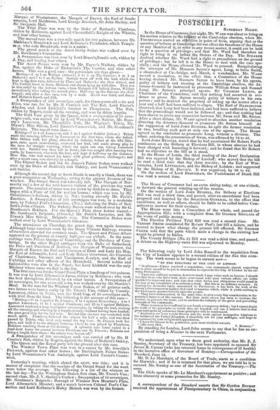POSTSCRIPT
SATURDAY NIGHT.
In the House of Commons blast night, Mr. WARD was about to bring on his motion relative to the Oery at the Cambridge election, when Mr. FRESHFIELD started an -tion in point of form, arguing that as the question of bribery at Cambridge did not affect the functions of the House or any Member of it, or refer to any recent matter, it could not be held to be a question of privilege ; and that Mr. Ward had therefore no right to bring it on before the Orders of the Day. The SPEAKER doubted whether Mr. Ward, bad a right to preaudience on the ground of privilege ; but he left it to the House to deal with the case spe- cially ; and the House allowed Mr. Ward to proceed. Recapitulating the attempts of Mr. Manners Sutton's agent, Long, to bribe Smith, a shoemaker at Cambridge, and Marsh, a watchmaker, Mr. WARD moved a resolution, to the effect that, a Committee of the House having declared Mr. Manners Sutton to have been, by his agents, guilty of bribery and treating at the Cambridge election, the At- torney-General be instructed to prosecute William Swan and Samuel Long, Mr. Sutton's principal agents. Sir CHARLES LEMON, as Chairman of the Committee, said that nothing bad occurred in evi- dence to prove Mr. Sutton morally guilty of bribery in his own person ; and he doubted the propriety of taking up the matter after a year and a half had been suffered to elapse. The Earl of DARLINGTON observed, that Long had been indicted, and had been suffered to believe that the proceedings would not be followed up ; and that nothing had been shown to prove any connexion between Mr. Swan and Mr. Sutton. AfW a short debate, Mr. WARE, agreed to abandon another resolution directing the Attorney-General to prosecute Mr. Sutton himself. At the suggestion of Lord Joni.' RUSSELL, he split the former resolution in two, levelling each part at only one of the agents. The House agreed to the resolution to prosecute Long, without a division. The other, ordering the prosecution of Swan, was affirmed by 78 to 46. Lord Jour; RUSSELL stated that he had ascertained Sir Robert Peel's sentiments on the Bribery at Elections Bill, in whose absence he had been charged with hastening it forward ; and he found that Sir Robert had no objection to the bill as it stood.
In the House of Lords, the third reading of the Jews' Declaration Bill was opposed by the Bishop of Landaff; who moved that the bill be read a third time that day three months ; by the Earl of W114- CHILSEA, Lord LYTTELTON, and the Bishop of London ; and supported by the Bishop of St. DAVID'S. It was negatived, by 98 to 64. On the motion of Lord BROUGHAM, the Punishment of Death Bill was read a second time.


























 Previous page
Previous page